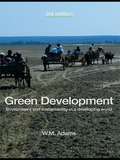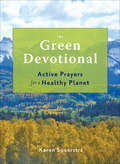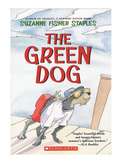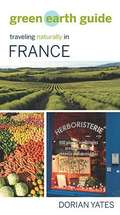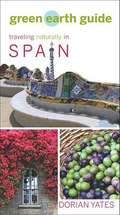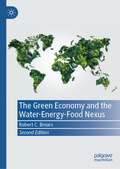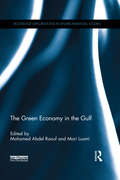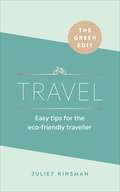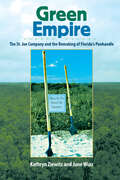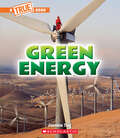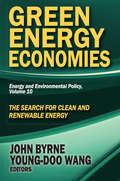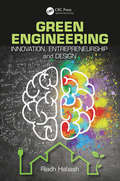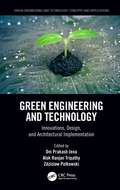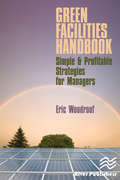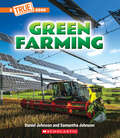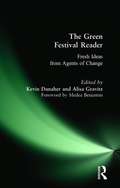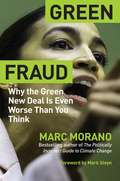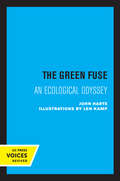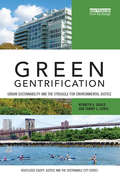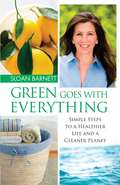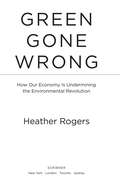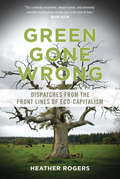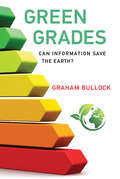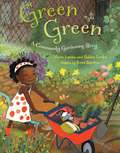- Table View
- List View
Green Development: Environment and Sustainability in a Developing World
by W. M. AdamsThe concept of sustainability lies at the core of the challenge of environment and development and the way governments, business and environmental groups respond to it. Green Development provides a clear and coherent analysis of sustainable development in both theory and practice. This third edition retains the clear and powerful argument of previous editions, but has been updated to reflect advances in ideas and changes in international policy. Greater attention has been given to political ecology, environmental risk and the environmental impacts of development. This fully revised third edition discusses: the origins of thinking about sustainability and sustainable development and its evolution to the present day the ideas that dominate mainstream sustainable development (ecological modernization, market environmentalism and environmental economics) the nature and diversity of alternative ideas about sustainability that challenge 'business as usual' thinking (for example ecosocialism, ecofeminism, deep ecology and political ecology) the dilemmas of sustainability in the context of dryland degradation, deforestation, biodiversity conservation, dam construction and urban and industrial development the nature of policy choices about the environment and development strategies and between reformist and radical responses to the contemporary global dilemmas. Green Development offers clear insights into the challenges of environmental sustainability and social and economic development. It is unique in offering a synthesis of theoretical ideas on sustainability and in its coverage of the extensive literature on the environment and development around the world. This book has proved its value to generations of students as an authoritative, thought-provoking and readable guide to the field of sustainable development.
The Green Devotional: Active Prayers for a Healthy Planet
by Karen SpeerstraOur planet, our home, is in crisis plain and simple and this collection of quotes, poems, essays, and prayers will inspire all to actively reverse the man-made cause of global warming, stem the tide of environmental destruction, and reconnect to the good earth. Short essays of topical interest introduce each of the eight sections of this book, and the 250 voices inside, most of them contemporary, begin to harmonize together as they seem to call out for their own canonical structure -- one bounded by the ancient elements: Earth, Air, Fire, Water. This collection of voices is like a "green book of devotional hours," reminiscent of the Books of Hours medieval people used to hold in their palms. It was called "a cathedral in your hands. " And like that medieval book, The Green Devotionalreminds us that we are connected to something broader and wiser than ourselves.
The Green Dog: A Mostly True Story
by Suzanne Fisher StaplesMy very own dog... All Suzanne can think of is her dream dog --- black-and-tan, with long silky fur and deep chocolate eyes. So when the perfect dog shows up one day, she is overjoyed. But Jeff, the dog, has a nose for trouble, and keeping him will be more difficult than Suzanne ever imagined.
Green Earth Guide: Traveling Naturally in France
by Dorian Yatesgreen earth guide: traveling naturally in France is written for the twenty-first-century traveler with a conscience. The first in a series of ecologically minded travel books exploring Western Europe, Green Earth Guide approaches France with a focus on staying green, directing readers to the latest resources for local and organic foods, natural health care, ecological businesses, parks, organic vineyards, public transportation, and other places of interest. Written in a friendly, accessible style by th...
Green Earth Guide: Traveling Naturally in Spain
by Dorian YatesSurveys by the International Ecotourism Society reveal that more than three-quarters of American travelers feel it is important not to damage the environment they are visiting. Green Earth Guide: Traveling Naturally in Spain helps travelers to Spain accomplish that goal. Author Dorian Yates focuses exclusively on where to find things green and alternative in one of the world's most popular travel destinations: local and organic foods, natural health care, ecological businesses, organic vineyards, renewable energy, yoga and meditation centers, national parks, public transportation, and other green places and services of interest.Written in a friendly, accessible style with personal anecdotes, how-to travel tips, and practical information, this second book in the series is aimed at helping travelers leave a smaller footprint wherever they venture. The book rescues readers who are accustomed to a certain level of green consciousness at home but end up compromising their values on vacation. Author Yates shows how to make the most environmentally beneficial choices for basic needs--food, shelter, health, exercise--while enjoying sites of ecological, historical, and natural interest along the way.From the Trade Paperback edition.
The Green Economy and the Water-Energy-Food Nexus
by Robert C. BrearsThis book argues that a variety of policies will be required to create synergies between the water-energy-food nexus sectors while reducing trade-offs in the development of a green economy. Despite rising demand for water, energy and food globally, the governance of water-energy-food sectors has generally remained separate with limited attention placed on the interactions that exist between them. Brears provides readers with a series of in-depth case studies of leading cities, states, nations and regions of differing climates, lifestyles and income-levels from around the world that have implemented a variety of policy innovations to reduce water-energy-food nexus pressures and achieve green growth. The Green Economy and the Water-Energy-Food Nexus will be of interest to town and regional planners, resource conservation managers, policymakers, international companies and organisations interested in reducing water-energy-food nexus pressures, environmental NGOs, researchers, graduate and undergraduate students.
The Green Economy in the Gulf: Lessons From The Uae's State-led Energy Transition (Routledge Explorations in Environmental Studies)
by Mohamed Abdel Raouf Mari LuomiFilling a void in academic and policy-relevant literature on the topic of the green economy in the Arabian Gulf, this edited volume provides a multidisciplinary analysis of the key themes and challenges relating to the green economy in the region, including in the energy and water sectors and the urban environment, as well as with respect to cross-cutting issues, such as labour, intellectual property and South-South cooperation.Over the course of the book, academics and practitioners from various fields demonstrate why transitioning into a ‘green economy’ – a future economy based on environmental sustainability, social equity and improved well-being – is not an option but a necessity for the Gulf Cooperation Council (GCC) States. Through chapters covering key economic sectors and cross-cutting issues, the book examines the GCC states’ quest to align their economies and economic development with the imperatives of environmental sustainability and social welfare, and proposes a way forward, based on lessons learned from experiences in the region and beyond.This volume will be of great relevance to scholars and policy makers with an interest in environmental economics and policy.
The Green Edit: Easy tips for the eco-friendly traveller
by Juliet KinsmanExplore the world and satisfy your wanderlust in the most eco-friendly way.How can we lessen our impact on the world without giving up the things we love? This series of easy-to-follow guides show that positive change is possible without radical changes to your everyday life.Sustainable tourism doesn’t have to mean vowing to never take another flight or spending holidays camping in your back garden. This short expert guide from eco-travel journalist Juliet Kinsman, takes you through every step of planning your trip, from booking to boarding, and arms you with everything you need to know for a lower-impact getaway.Whether it's explaining how to know which plane to take (yes, some are greener than others) or how to avoid the mini toiletries trap; this book shows that you can save the planet and still live life to the full.
Green Empire: The St. Joe Company and the Remaking of Florida's Panhandle
by Kathryn Ziewitz June WiazSince the Great Depression, the St. Joe Company (formerly the St. Joe Paper Company) has been Florida's largest landowner, a forestry and transportation conglomerate whose influence has been commensurate with its holdings. The company owns nearly one million acres, mainly in northwestern Florida, where undeveloped coastal and riverside landscapes boast some of the state's most scenic and ecologically diverse areas. For 60 years, the company focused on growing trees, turning them into paper, and managing its ancillary businesses. In the late 1990s, the company shifted directions: it sold its paper mill, changed its name, and launched a concerted drive to turn its natural-resource assets into greater profits. Today the St. Joe Company is a critical and fiscally powerful force in the real-estate development of northwest Florida, with access to the most influential people in government. Based on hundreds of sources--including company executives, board members, and investors, as well as outside observers--this factual and balanced history describes the St. Joe Company from the days of its founders to the workings and dealings of its present-day heirs. For anyone concerned with land use and growth management, particularly those with an interest in Florida's fragile wildlife and natural resources, Green Empire will illuminate the issues surrounding the relationship between one of the most ambitious players in Florida's real-estate market and the state's last frontier.
Green Energy (A True Book (Relaunch))
by Jasmine TingEnvision a brighter future with this STEM-based subset of True Books.We use a lot of energy to power our lives = from our homes and cars to our tablets and handheld games. The challenge facing us today is finding sustainable energy methods that will ensure a green future. There are seven different types of green energy = and they are the only types that don't pollute our Earth. We have learned how to harness the power of the sun, wind, water, and Earth. And technological innovations have allowed us to put these alternative energies to work in our everyday lives. Green Energy will show you how.ABOUT THE SERIES:What would a green future look like? Will trains and airplanes be powered by the sun? Will we have homes that have zero impact on the environment? The most pressing challenge facing us today is how to ensure a healthy Earth for ourselves and future generations. This STEM-based set of A True Books introduces students to the engineering innovations that can help us reach those goals. Interesting information is presented in a fun, friendly way = and in the simplest terms possible = and will inspire kids to start envisioning and enacting a more sustainable future.
Green Energy Economies: The Search for Clean and Renewable Energy (Energy And Environmental Policy Ser. #10)
by JOHN BYRNE AND YOUNG-DOO WANGGreen Energy Economies offers insight into the major drivers that are shaping a new future powered by clean energy sources. Assembling cutting-edge researchers as contributors, the book provides a comprehensive account of the shift underway, examining in detail the complexities and intricacies involved with such a transition. The book first details the promises and problems of a green energy transition. Next, it explores the economic benefits that a comprehensive strategy toward a green energy economy might create. Then it investigates how communities will be affected and explores the social, cultural, and other changes that are likely to result. Finally, it explores the shift toward new technologies in-depth. Green Energy Economies concludes with policy options that support a transition to a better energy, environmental, and economic future. The contributors argue that a green energy economy offers great promise, but its realization will require making hard choices, and soon. They argue for investments in renewable energy and economic systems that can deliver a sustainable and equitable future. This book makes a forceful case for a green future.
Green Engineering: Innovation, Entrepreneurship and Design
by Riadh HabashThis is a primary text project that combines sustainability development with engineering entrepreneurship and design to present a transdisciplinary approach to modern engineering education. The book is distinguished by extensive descriptions of concepts in sustainability, its principles, and its relevance to environment, economy, and society. It can be read by all engineers regardless of their disciplines as well as by engineering students as they would be future designers of products and systems. This book presents a flexible organization of knowledge in various fields, which allows to be used as a text in a number of courses including for example, engineering entrepreneurship and design, engineering innovation and leadership, and sustainability in engineering design
Green Engineering and Technology: Innovations, Design, and Architectural Implementation (Green Engineering and Technology)
by Om Prakash Jena Alok Ranjan Tripathy Zdzislaw PolkowskiEscalating urbanization and energy consumption have increased the demand for green engineering solutions and intelligent systems to mitigate environmental hazards and offer a more sustainable future. Green engineering technologies help to create sustainable, eco-friendly designs and solutions with the aid of updated tools, methods, designs, and innovations. These technologies play a significant role in optimizing sustainability in various areas of energy, agriculture, waste management, and bioremediation and include green computing and artificial intelligence (AI) applications. Green Engineering and Technology: Innovations, Design, and Architectural Implementation examines the most recent advancements in green technology, across multiple industries, and outlines the opportunities of emerging and future innovations, as well as practical real-world implementation. Features: Provides different models capable of fulfilling the criteria of energy efficiency, health and safety, renewable resources, and more Examines recycling, waste management, and bioremediation techniques as well as waste-to-energy technologies Presents business cases for adopting green technologies including electronics, manufacturing, and infrastructure projects Reviews green technologies for applications such as energy production, building construction, transportation, and industrialization Green Engineering and Technology: Innovations, Design, and Architectural Implementation serves as a useful and practical guide for practicing engineers, researchers, and students alike.
Green Facilities Handbook: Simple and Profitable Strategies for Managers
by Eric WoodroofMeeting a need in the marketplace for information on how to operate a sustainable facility and reduce carbon emissions, the Green Facilities Handbook clearly explains why green business is good business and delineates practical strategies to green your operations in energy and management. The book explores issues in the greening of a facility, including janitorial considerations, fuel choices for fleets, and recycling. Additional information is provided on carbon reduction terminology, monitoring and reporting, and carbon trading as well as offset strategies. Special bonus chapters include valuable information on financing and procedures for “green” marketing.
Green Farming (A True Book (Relaunch))
by Daniel Johnson Priyanka LamichhaneEnvision a brighter future with this STEM-based subset of True Books.Thanks to the development of agriculture, our Earth can feed the almost 8 billion people that call it home. But the challenge facing us today is how to make the practice of large-scale farming sustainable. We have learned how to use alternative energies = like solar and wind power = to run our farms. We have also learned how to use the land and the animals on it in a more environmentally friendly way. Green Farming will show you how.ABOUT THE SERIES:What would a green future look like? Will trains and airplanes be powered by the sun? Will we have homes that have zero impact on the environment? The most pressing challenge facing us today is how to ensure a healthy Earth for ourselves and future generations. This STEM-based set of A True Books introduces students to the engineering innovations that can help us reach those goals. Interesting information is presented in a fun, friendly way = and in the simplest terms possible = and will inspire kids to start envisioning and enacting a more sustainable future.
The Green Festival Reader: Fresh Ideas from Agents of Change
by Alisa Gravitz Kevin DanaherThe Green Festivals now draw over 100,000 visitors every year in four U.S. cities. This book collects the most memorable talks from all four festivals on the most urgent social issues of the day.
Green Fraud: Why the Green New Deal Is Even Worse than You Think
by Marc Morano"If you care about America's future, read this book."—Mark Levin "A must-read book that shows how the Green New Deal is dangerous, impractical, misguided, and guaranteed to fail with disastrous results for the American people.&”—Sean Hannity A New Lockdown to "Save" the Climate That&’s what&’s in store for us if Alexandria Ocasio-Cortez and the Democrats pass their radical climate plan—the Green New Deal. It is packed with guarantees so completely irrelevant to the problem it purports to &“solve&” (like &“free college&” and incomes for everyone &“unable or unwilling to work&”) that even its boosters have admitted it&’s not really about the climate. The intrepid Marc Morano, author of the bestselling Politically Incorrect Guide to Climate Change, breaks down the science and the politics to expose the truth about the Green New Deal: • The science is settled: copious evidence—and prominent defections from the &“climate consensus&”—make clear we are not facing a man-made climate disaster • &“Climate change&” is the perfect Trojan horse for the socialist agenda of the Left • Fossil fuels lifted the West out of poverty—but our elites now want to deny them to the world&’s poor • The Green New Deal is on a collision course with self-government and our fundamental rights Climate change has already been &“solved&” multiple times over the past two decades—with highly touted international agreements—and yet it never goes away as an excuse for leftist policies that will cripple our economy, impoverish the world, and take away our freedoms. Packed with telling statistics, damning quotations, and real science, Green Fraud is your source for all the facts you need to understand—and resist—the threat.
The Green Fuse: An Ecological Odyssey
by John HarteA widely respected ecological scientist and activist draws on the poet's image and his own environmental research to demonstrate the many interconnections among the world's ecosystems. John Harte takes us from Alaskan salmon runs and the Florida everglades to South Pacific coral reefs and the bleak Tibetan plateau. The result is that rare book that bridges the cultures of science and art. Lyrical, vivid portraits of natural wonders and the threats to them are combined with precise scientific accounts of natural processes and their disturbances. The Green Fuse will show nonscientists the fascination of ecological detective work and renew scientists' love for the beauty of the world under their microscopes. Harte's stories illuminate, without sermonizing, the damage to natural systems brought about by technological hubris and calculated political ruthlessness. "The green fuse" symbolizes the basic unity behind natural diversity. But a fuse may also be the weak link in an overloaded system or the slow burning wick on an ecological bomb. As The Green Fuse reminds us, the energies that created human liberation from nature can also be those that lead to the human destruction of nature. This title is part of UC Press's Voices Revived program, which commemorates University of California Press’s mission to seek out and cultivate the brightest minds and give them voice, reach, and impact. Drawing on a backlist dating to 1893, Voices Revived makes high-quality, peer-reviewed scholarship accessible once again using print-on-demand technology. This title was originally published in 1993.
Green Gentrification: Urban sustainability and the struggle for environmental justice (Routledge Equity, Justice and the Sustainable City series)
by Tammy L. Lewis Kenneth A. GouldGreen Gentrification looks at the social consequences of urban "greening" from an environmental justice and sustainable development perspective. Through a comparative examination of five cases of urban greening in Brooklyn, New York, it demonstrates that such initiatives, while positive for the environment, tend to increase inequality and thus undermine the social pillar of sustainable development. Although greening is ostensibly intended to improve environmental conditions in neighborhoods, it generates green gentrification that pushes out the working-class, and people of color, and attracts white, wealthier in-migrants. Simply put, urban greening "richens and whitens," remaking the city for the sustainability class. Without equity-oriented public policy intervention, urban greening is negatively redistributive in global cities. This book argues that environmental injustice outcomes are not inevitable. Early public policy interventions aimed at neighborhood stabilization can create more just sustainability outcomes. It highlights the negative social consequences of green growth coalition efforts to green the global city, and suggests policy choices to address them. The book applies the lessons learned from green gentrification in Brooklyn to urban greening initiatives globally. It offers comparison with other greening global cities. This is a timely and original book for all those studying environmental justice, urban planning, environmental sociology, and sustainable development as well as urban environmental activists, city planners and policy makers interested in issues of urban greening and gentrification.
Green Goes with Everything
by Sloan BarnettImagine if your best friend gave you vital information that could protect you and your family, and save you money, and help the planet. Imagine if you were given clear, simple choices, small changes that could have a big impact on your life. And you could still wear leather shoes and deodorant. You'd listen, right? Well, think of Today show contributor Sloan Barnett as that friend. A mother of three, a dedicated consumer advocate, Sloan gives us a fast, simple, down-toearth primer on the ways our homes are making us sick, and what we can all do to transform them into the safe sanctuaries we want and need them to be. Sloan exposes the toxic truth behind the household products we use every day -- from laundry detergent to toothpaste to lipstick. She explains how these and other seemingly benign stuff can harm us and our children. She offers an array of alternatives, and inspires us to see that we're never helpless: Every day, we have the power to make better, smarter, safer choices. Packed with common sense and sass, product picks and practical tips, Green Goes With Everything is for everyone who wants to live a healthier life.
Green Gone Wrong: How Our Economy Is Undermining the Environmental Revolution
by Heather RogersIn Green Gone Wrong environmental writer Heather Rogers blasts through the marketing buzz of big corporations and asks a simple question: Do today’s much-touted "green" products—carbon offsets, organic food, biofuels, and eco-friendly cars and homes—really work? Implicit in efforts to go green is the promise that global warming can be stopped by swapping out dirty goods for "clean" ones. But can earth-friendly products really save the planet? This far-reaching, riveting narrative explores how the most readily available solutions to environmental crisis may be disastrously off the mark. Rogers travels the world tracking how the conversion from a "petro" to a "green" society affects the most fundamental aspects of life—food, shelter, and transportation. Reporting from some of the most remote places on earth, Rogers uncovers shocking results that include massive clear-cutting, destruction of native ecosystems, and grinding poverty. Relying simply on market forces, people with good intentions wanting to just "do something" to help the planet are left feeling confused and powerless.Green Gone Wrong reveals a fuller story, taking the reader into forests, fields, factories, and boardrooms around the world to draw out the unintended consequences, inherent obstacles, and successes of eco-friendly consumption. What do the labels "USDA Certified Organic" and "Fair Trade" really mean on a vast South American export-driven organic farm? A superlow-energy "eco-village" in Germany’s Black Forest demonstrates that green homes dramatically shrink energy use, so why aren’t we using this technology in America? The decisions made in Detroit’s executive suites have kept Americans driving gas-guzzling automobiles for decades, even as U.S. automakers have European models that clock twice the mpg. Why won’t they sell these cars domestically? And what does carbon offsetting really mean when projects can so easily fail? In one case thousands of trees planted in drought-plagued Southern India withered and died, releasing any CO2 they were meant to neutralize. Expertly reported, this gripping exposé pieces together a global picture of what’s happening in the name of today’s environmentalism. Green Gone Wrong speaks to anyone interested in climate change and the future of the natural world, as well as those who want to act but are caught not knowing who, or what, to believe to protect the planet. Rogers casts a sober eye on what’s working and what’s not, fearlessly pushing ahead the debate over how to protect the planet.
Green Gone Wrong
by Heather RogersIn Green Gone Wrong environmental writer Heather Rogers blasts through the marketing buzz of big corporations and asks a simple question: Do today's much-touted "green" products--carbon offsets, organic food, biofuels, and eco-friendly cars and homes--really work? Implicit in efforts to go green is the promise that global warming can be stopped by swapping out dirty goods for "clean" ones. But can earth-friendly products really save the planet? This far-reaching, riveting narrative explores how the most readily available solutions to environmental crisis may be disastrously off the mark. Rogers travels the world tracking how the conversion from a "petro" to a "green" society affects the most fundamental aspects of life--food, shelter, and transportation. Reporting from some of the most remote places on earth, Rogers uncovers shocking results that include massive clear-cutting, destruction of native ecosystems, and grinding poverty. Relying simply on market forces, people with good intentions wanting to just "do something" to help the planet are left feeling confused and powerless.Green Gone Wrong reveals a fuller story, taking the reader into forests, fields, factories, and boardrooms around the world to draw out the unintended consequences, inherent obstacles, and successes of eco-friendly consumption. What do the labels "USDA Certified Organic" and "Fair Trade" really mean on a vast South American export-driven organic farm? A superlow-energy "eco-village" in Germany's Black Forest demonstrates that green homes dramatically shrink energy use, so why aren't we using this technology in America? The decisions made in Detroit's executive suites have kept Americans driving gas-guzzling automobiles for decades, even as U.S. automakers have European models that clock twice the mpg. Why won't they sell these cars domestically? And what does carbon offsetting really mean when projects can so easily fail? In one case thousands of trees planted in drought-plagued Southern India withered and died, releasing any CO2 they were meant to neutralize. Expertly reported, this gripping exposé pieces together a global picture of what's happening in the name of today's environmentalism. Green Gone Wrong speaks to anyone interested in climate change and the future of the natural world, as well as those who want to act but are caught not knowing who, or what, to believe to protect the planet. Rogers casts a sober eye on what's working and what's not, fearlessly pushing ahead the debate over how to protect the planet.
Green Governance
by Burns H. Weston David BollierThe vast majority of the world's scientists agree: we have reached a point in history where we are in grave danger of destroying Earth's life-sustaining capacity. But our attempts to protect natural ecosystems are increasingly ineffective because our very conception of the problem is limited; we treat "the environment" as its own separate realm, taking for granted prevailing but outmoded conceptions of economics, national sovereignty, and international law. Green Governance is a direct response to the mounting calls for a paradigm shift in the way humans relate to the natural environment. It opens the door to a new set of solutions by proposing a compelling new synthesis of environmental protection based on broader notions of economics and human rights and on commons-based governance. Going beyond speculative abstractions, the book proposes a new architecture of environmental law and public policy that is as practical as it is theoretically sound.
Green Grades: Can Information Save the Earth?
by Graham BullockA comprehensive assessment and analysis of the validity, trustworthiness, and effectiveness, of such environmental ratings as ENERGY STAR, LEED, and USDA Organic. Consumers are confronted with a confusing array of environmental ratings on products that range from refrigerators to shampoos. Is the information that these ratings represent trustworthy, accurate, or even relevant to environmental concerns? “Information optimists” believe that these “green grades” can play an important role in saving the planet. “Information pessimists” consider them a distraction from pursuing legislative and regulatory actions. In this book, Graham Bullock offers a comprehensive assessment and analysis of the effectiveness and validity of such environmental ratings as ENERGY STAR, USDA Organic, the Forest Stewardship Council, LEED, and the Toxic 100 Air Polluters Index. Bullock stakes out a position as an “information realist,” acknowledging both the contributions and the limitations of these initiatives. Drawing on interviews, case studies, and an original dataset of 245 environmental ratings and certifications, he examines what he calls the information value chain of green grades: organizational associations, content, methods, interfaces, and outcomes. He explores the relevance of the information to the issues; the legitimacy and accountability of sponsoring or cooperating organizations; the reliability of methods used to develop the information; the prominence and intelligibility of communication to the public; and the effects and effectiveness of the information after it emerges from the value chain. Bullock's analysis offers a realistic appraisal of the role of information-based environmental governance—its benefits and shortcomings—and its relation to other governance strategies.
Green Green: A Community Gardening Story
by Marie Lamba Baldev LambaGreen grass is wide and fresh and clean for a family to play in, and brown dirt is perfect for digging a garden. But when gray buildings start to rise up and a whole city builds, can there be any room for green space? The neighborhood children think so, and they inspire the community to join together and build a garden for everyone to share in the middle of the city.
